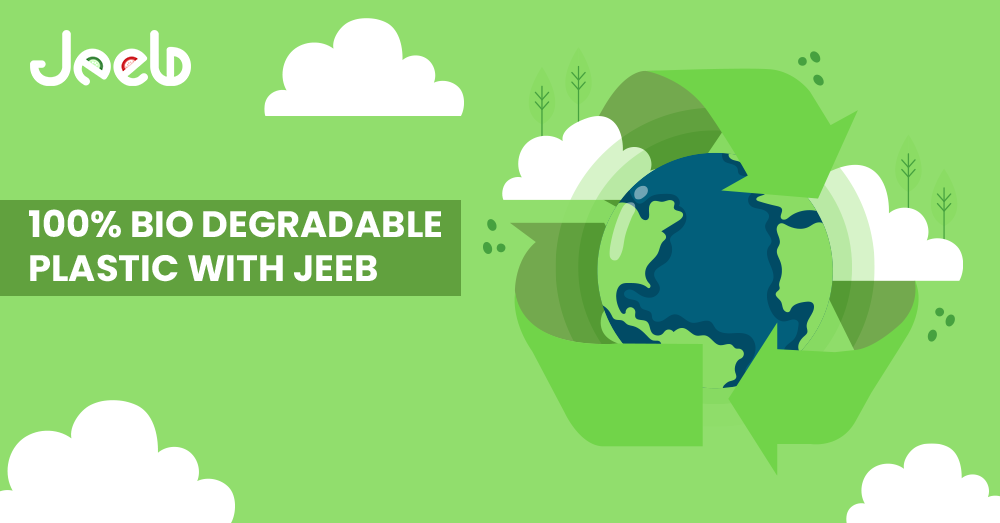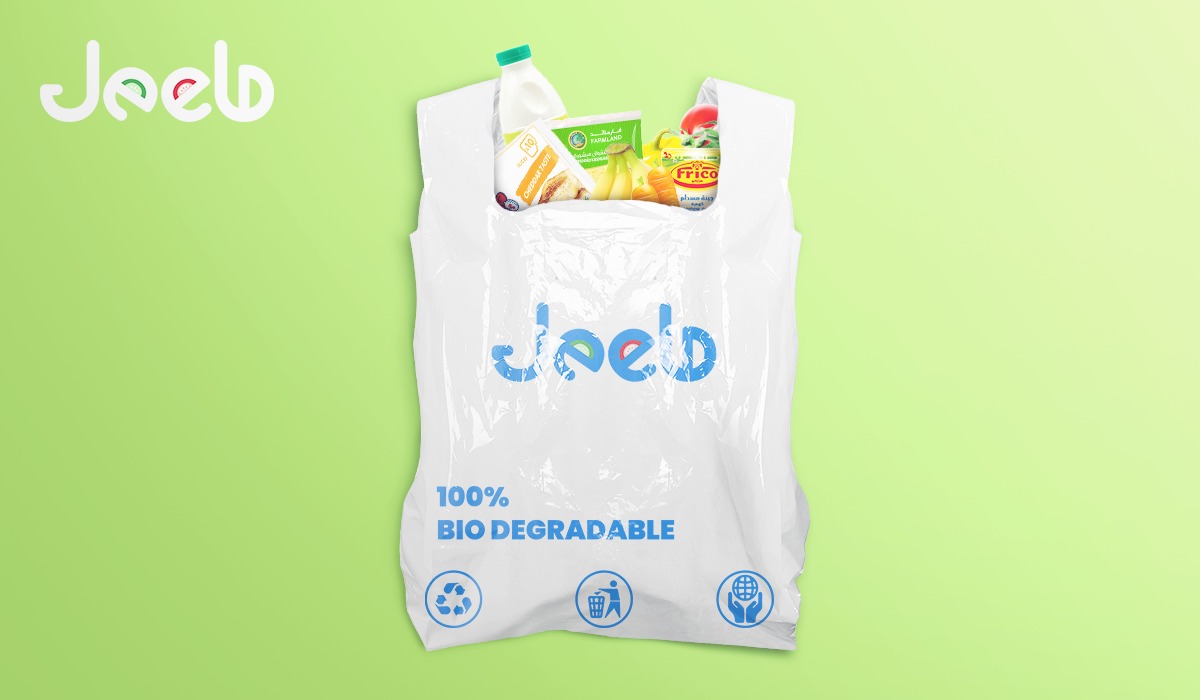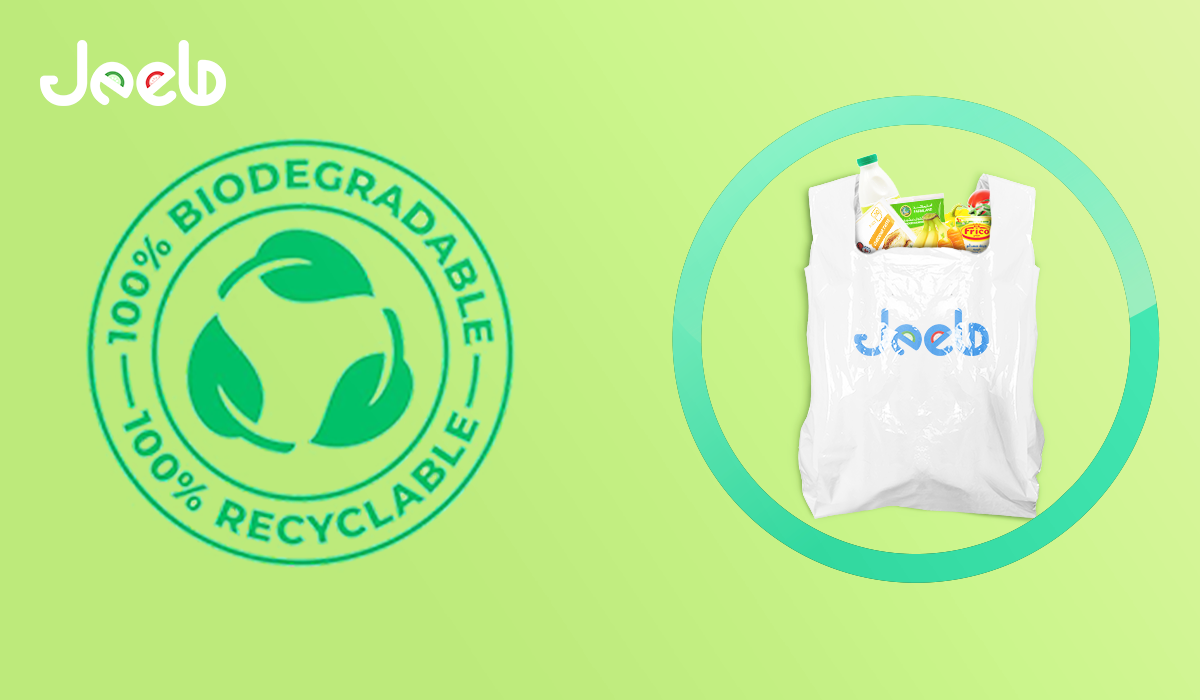100% Biodegradable with Jeeb

With grocery shopping getting easier online, it has been a massive increase in the use of plastic. People tap and order and get all their kitchen essentials at their doorsteps, packed in plastic boxes and bags. Meanwhile, Jeeb aims to deliver groceries in a way best for both customers and the environment. In the era of ever-increasing carbon emissions, Jeeb is one of the very first delivery apps to go carbon-neutral using 100% biodegradable packaging.
Pursuing the 100% Biodegradable mission, Jeeb feels the responsibility to save the Earth, at least to the level that Jeeb can. You know what? Plastic is good until it’s used. Once it is dropped off, it pollutes our cities, oceans, forests, and air. Instead of using plastic bags, we use paper boxes and bags to deliver groceries. Rather than polluting the environment with plastic, we prefer paper cartons to pack milk.
Carbon footprint and how Jeeb’s biodegradable packaging can help diminish it

Everything from plastic bags to polyethylene wrappers, from kitchen and bathroom pipes to electric wires, contributes to the carbon footprint. Whenever plastic is dropped off in seas and oceans, thrown away in garbage storage facilities, and burned in the air, it emits carbon, kills sea life, and pollutes the air. That’s why Jeeb has introduced carbon-neutral, eco-friendly, and 100% biodegradable packaging, ultimately taking steps to reduce its carbon footprint.
Although we all know eliminating carbon footprints is not a game, a person, or a service can’t achieve it alone. On its part, Jeeb has initiated carbon-neutral policies by introducing 100% biodegradable deliveries. Now customers must help Jeeb and others who care for the environment reduce environmental pollution and carbon emissions.
Plastic alternatives, their effects, and how customers can help Jeeb reduce environmental pollution

You might be surprised to hear that many alternatives to plastic are available on the market. Rather than using plastic, Jeeb goes with paper packaging, bamboo cutlery, and wood boxes. Initially, it might appear an expensive idea but it is worth it if it makes Earth a better place to live.
Not all plastic alternatives are 100% eco-friendly, yet they reduce carbon emissions by a huge margin. However, while using paper and wood for packaging might feel like taking unfair advantage of trees, this loss can be minimized by planting more trees than cutting them down.
After Jeeb announced a 100% biodegradable packaging policy, it’s now the responsibility of customers to play their part. Everybody should help reduce environmental pollution by ceasing or at least diminishing the use of plastic.
Conclusion
To sum up, thinking about growing carbon pollution, Jeeb has come up with a brilliant idea for limiting carbon emissions. Jeeb’s extraordinary decision to go carbon-neutral by using 100% biodegradable packing material is going to have a positive impact on society. We are quite hopeful to see a better earth with groceries being delivered in eco-friendly packaging. Taking the facts as stated, Jeeb is one of the very first grocery delivery apps chosen to be carbon neutral.
FAQs
Is biodegradable better than plastic?
Biodegradables are usually better than plastic. They are manufactured from natural substances such as starches, proteins, cellulose, and other organic materials that don’t take so long to break down and absorb back into the environment. The decomposition of biodegradables takes anywhere from a few months to several years. Plastic, on the other hand, takes hundreds of years to decompose. When wasted, plastic makes the land barren, kills the aquatic life in rivers and oceans, and causes pollution in the air.
Which is the cheapest biodegradable packaging material?
With innovative packaging techniques, mushroom, seaweed, and cornstarch packaging, leaf cutlery, recycled cupboards, and textiles are the cheapest yet the best alternatives to plastic. Companies that switched to using biodegradables instead of plastic prefer paper, mushrooms, cornstarch, and other organic substances as they are durable and budget-friendly. However, as biodegradable packaging is manufactured using trees and plant extracts, it's the need of the hour to plant more and more trees to balance the environmental factors. Also, planting trees would help keep the biodegradables prices down.
What are the benefits of biodegradable packaging?
Biodegradable packaging helps us reduce environmental pollution because, if it's wasted, it doesn’t cause a carbon footprint. Moreover, using biodegradables can help keep the water, land, and air clean and free of plastic waste, ultimately leading to a healthy life. Apart from that, using biodegradable packaging helps reduce the wastage of water and other organic substances as its manufacturing requires fewer substances.
What is the most biodegradable packaging?
Cellulose packaging is the most biodegradable one. Manufactured using wood, cotton, and hemp, its fast decomposing properties make it the most sustainable and compostable alternative to plastic. Because it is a versatile, inexpensive, and non-toxic packaging material, it is used by many food and grocery delivery apps. Moreover, its moisture resistance helps store food and perishable items safely. Plus, it benefits the environment because its manufacturing consumes significantly less water, solid material, and electricity.
Is biodegradable the same as compostable?
Biodegradable and compostable are two related but distinct terms. Biodegradables are materials capable of being broken down by living organisms, such as bacteria, fungi, or other microorganisms. However, the compostable materials break down into nutrient-rich compost over time. To make it simple, biodegradable materials can be compostable, but not all biodegradable products are designed to be compostable.
App link: Google Play & App Store
